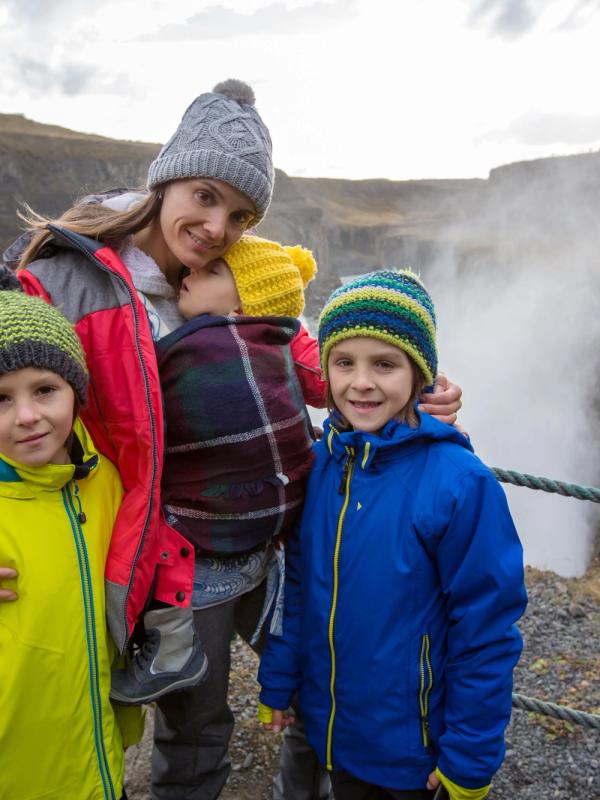
Understanding Iceland’s Unique Last Names & Natural Wonders Names
Iceland is one of the few countries in the world that still uses a patronymic and matronymic naming system.
Key Takeaways
- Iceland primarily uses a patronymic and matronymic naming system instead of inherited family surnames
- Since 2019, parents can use the gender-neutral suffix "-bur" for surnames
- There's a Committee that has to approve new names, as those names will create new surnames
- Icelandic place names have helpful suffixes like "-foss" for waterfalls and "-jökull" for glaciers
In most countries, especially in the Western world, we are used to having the same surname our parents have. Maybe your father’s surname, perhaps your mother’s, and sometimes both of them.
However, that’s not the case in Iceland. It’s possible that you have met someone from Iceland before. And maybe, if you were lucky enough, you became friends with that person. And once you started talking about your families, you surely were surprised when you learned that person did not carry their father’s or mother’s surname.
That’s simply because Iceland uses a naming system that’s quite different from what we are accustomed to. In this guide, we’re going to explain how the Icelandic surnames work.
We’ll also shed some light on geographical names in the country, and provide valuable information about some of the special characters of the Icelandic language.
What Kind of Last Names Are There in Iceland?
We usually bear the same name our parents have—a name that our father or mother got from their parents, and that has passed through generations—our family name. That is not the case for many Icelandic people. They inherit their parents’ name, too, but in a different way.
But that’s not the only system. Some people in Iceland get the same last name their parents have in the same way most of the countries do. But let’s get into the differences.
Patronymic Names
This is the most common way of forming surnames in Iceland. In fact, nearly all the surnames in the country are strictly patronymic. Some are matronymic, a tendency on the rise, but we’ll get into those a bit later.
A patronymic surname is a surname formed from the father’s given name. Many cultures and countries have done this in the past, but it’s been lost in the last few centuries.
When a child is born, the most common situation is that they will receive a given name and then take his father’s name as a surname. Then, the termination –son – no surprise, it literally means son- is added if the child is a boy. If it’s a girl, the termination added is -dóttir - as you have guessed, it means daughter.
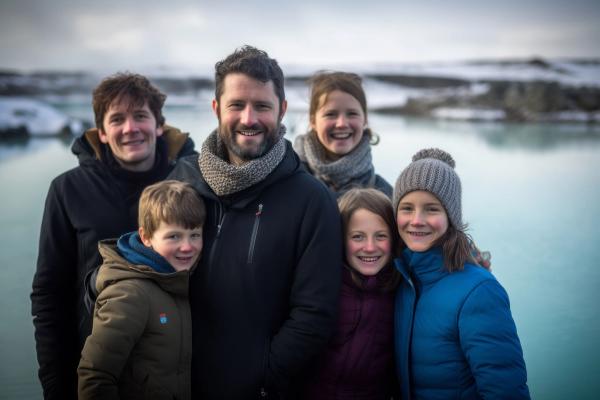
We are going to use, as an example, a famous Icelander: Hafþór Júlíus Björnsson. This professional strongman rose to fame thanks to his role as Ser Gregor Clegane, aka “The Mountain”, in the acclaimed TV series Game of Thrones.
Hafþór’s father’s surname is not Björnsson, but Reynisson. His full name is Björn Þor Reynisson. This way, we can clearly see why The Mountain’s surname is Björnsson. To his father’s name, just the suffix –son is added. We can also notice that there is an extra s between the two parts of the surname, which is always added.
Is It The Same for a Female?
As we previously explained, this is how a surname is formed in the case of a male. But what’s the difference when it comes to a female? Thankfully for our case, Hafþór Júlíus Björnsson has two sisters.
Their names are Bryndís Björg Björnsdóttir and Hafdís Lind Björnsdóttir. It’s easy to see the pattern here. They both share the same surname, which is formed by taking their father’s name and adding—dóttir. As it happens in the case of a male, an extra “s” is added between the two parts.
This will continue down the family, using the same pattern. We can take a risk and assume that if Hafþór had a son, his surname would be Hafþórsson. If he had a daughter, she would be named Hafþórsdóttir.
Matronymic Names
Matronymic names are basically the same as patronymic names. The only difference is that the child takes the mother’s name. Most of Iceland’s surnames are formed from the father’s name, but sometimes the mother’s is used.
Traditionally this only happened in the case of single mothers or if the children wanted to cut ties with their father. In the latter case, they could change their surname if the authorities approved.
Luckily, with the advance of social policies, it’s now a matter of choice. A family can nowadays choose which of the parents' names will be used.
There’s a singularity that also happens in some families in Iceland. It’s the case of unmarried parents. In these families, the children can adopt either of the parents’ surnames. The particularity is that different children can adopt different surnames. Let’s imagine a couple where the woman is named Katrín and the man Guðmund. Their children could be Katrínarson or Katrínardottir and Guðmundsson or Guðmunddótir.
In this case, the genitive of the mother’s name would be -ar. If the name ends in –a, it will change to –u. The genitive in the father's name remains the same unless the name ends in –i. In that case, it will change to –a.
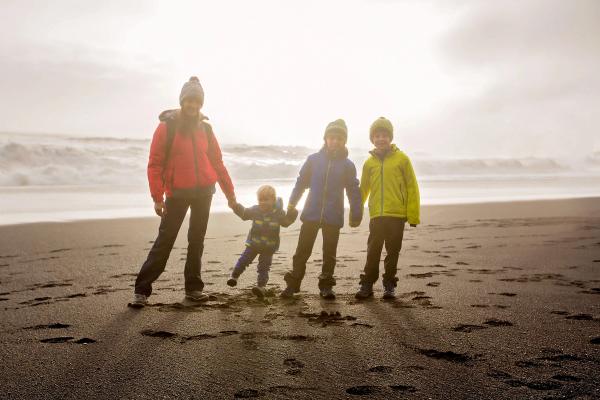
Non-binary names
Since 2019, it’s been legal to use a gender-neutral suffix for children’s surnames. The Icelandic Parliament passed a bill that allowed parents to use the termination –bur to end surnames. Bur is a poetic form of the word son, and it’s now reused as a neuter noun.
Inherited family name
Even though patronymic and matronymic names are the most common ways to form a surname in Iceland, they are not the only ways. Some people inherit the same surname their parents have. Just in the same way most of the countries do.
Some families use this system, especially people who have lived abroad for some time and had to adapt to those countries' laws. For example, many Icelanders emigrated to Denmark in the 20th century. While living there, if they had children, they had to pass their surnames to their kids, as Danish law does not allow for a surname the way it does in Iceland.
This also applies to foreigners who move to Iceland. Former Iceland’s prime minister Geir Haarde, whose father was from Norway, is an example.
Before 1925, it was legal to adopt new family names by personal choice. That's the case of Nobel prize-winning author Halldór Laxness. He was born Halldór Guðjónsson in Reykjavik in 1902. His family moved to a farm called Laxnes when he was three. Later, he decided to change his surname to Laxness.
Since 1925, it has been illegal to create new family names unless the person has a legal right to do so.
Middle names
As it happens in many cultures and countries, it’s quite common for people from Iceland to have a middle name. Normally, that middle name is just a regular name that the parents give to their children. It could be to honor a senior family member or just because they liked it.
Sometimes, however, the middle name takes the shape of a classic Icelandic surname, so the person seems to have multiple surnames. This has been done in social circles or families where two members share the same given name or surname.
Traditionally, they’d be told apart by their paternal grandfather 's name. For example, let's take two people called Ólafur Jonsson. One could be named Ólafur Jonsson Mattiasonar (Ólafur, son of Jon, son of Mattias). The other could be Ólafur Jonsson Bjarnasonar (Ólafur, son of Jon, son of Bjarni).
The Icelandic Naming Committee
The Government of Iceland has a body in charge of regulating names in the country. The Icelandic Naming Committee must approve the use of a name that has not been used in the past. These new names must meet a few rules to be accepted:
- First, the Committee takes into consideration if that name can be easily incorporated into the Icelandic language.
- Then, it must include at least one letter of the Icelandic alphabet.
- Finally, it must be possible to decline the name to later form the appropriate surname.
Surnames & Social Rules
In Iceland, the most common way to address somebody is by using their first name, even in formal contexts. Even a person with a prominent position would be introduced either by their first name or using their name and surname.
In social circles where two people share the same first name, they are usually told apart by adding the surname. But it’s very common to shorten the surname, removing the suffix son or dóttir. This way, the person would be called by their name and their father’s or mother's name.
A unique thing that happens here in Iceland is the order of the telephone book. People are sorted by their first name rather than their surname. Sometimes, the person's profession is added after to reduce ambiguity.
When an Icelander marries a foreigner
What happens when people from Iceland have children with people from other countries? Well, the most common thing is that the children inherit the family name.
Some Icelanders choose to introduce a cultural meaning to their children’s names through the middle name. For example, famous singer Björk has a daughter with American artist Matthew Barney. The girl’s name is Isadora Bjarkardóttir Barney. This way, the cultural significance of Icelandic names is passed down.
Outside Iceland
People from Iceland who have emigrated to other countries lose the patronymic or matronymic system when they have children. As the laws of the countries don’t allow this system, they are forced to pass down their surname. Then, the original patronym becomes a new family name.
It’s not uncommon for Icelandic families to encounter problems when traveling to other countries, since immigration officers are not always aware of the naming system in Iceland. Seeing a family with different surnames on their passport surely has created more than one headache. This is less common in other Nordic countries, as the historical ties between them have made Iceland’s surnames familiar to them.
Iceland’s name
There’s a recurrent joke about the country's name. Many people complain about the difference between Iceland and Greenland. They say that their names have been mixed, as Iceland is a very green country, while Greenland is a vast territory mostly covered in ice.
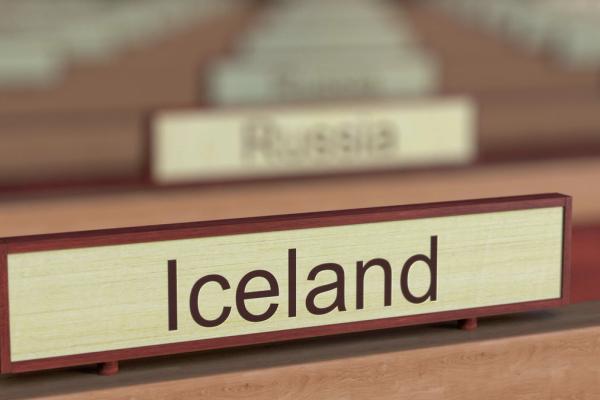
They are both relatively close and may share some similarities, but they are very different from one another.
If you want to learn more about why they are called this way, check our guide about this topic: Unraveling the Mystery: The Origins of Iceland's Name.
Geographical names
For foreigners, the names of places in Iceland can be difficult and confusing. We get it: Icelandic is not an easy language, with sometimes very long words that might seem impossible to pronounce.
However, there are a few tricks that can help you identify some places just by their names, which can be very useful when visiting the country. We are not going to explain every town or landmark name in Iceland (we could be doing that for days), but we’ll explain a few.
Waterfalls
If you check the list of attractions in Iceland, you can see that many of them end in –foss. Foss literally means waterfall. So, if you are checking your map or list of possible places to visit, you’ll know that you’ll go to a waterfall if the place’s name ends in –foss.
Some famous waterfalls in Iceland are Gullfoss, Skogafoss, and Seljalandsfoss.
Glaciers
The same happens with the places whose names end in -jökull. This word means glacier, so you can be confident of what to expect when visiting these places.
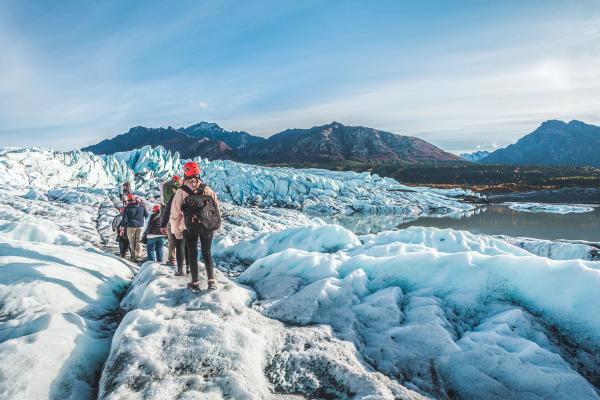
Reykjavik
–Vík, such as in Reykjavík, means “bay”. That would give you a clue of the place you are going to just by the end of the word. In fact, the capital’s name means Smoky Bay.
Fjords
Some awesome natural features in Iceland that are easy to spot are the fjords. Their names mostly end with the suffix -fjörður.
Lakes
If you want to visit a lake, look for names that end in –vatn. This way you won’t be mistaken.
| Sufixx | Meaning | Example |
| -foss | Waterfall | Skógafoss |
| -jökull | Glacier | Vatnajökull |
| -vík | Bay | Reykjavik |
| -fjörður | Fjord | Stakksfjörður |
| -vatn | Lake (or water) | Mývatn |
Conclusion: How to decipher names in Iceland
As we’ve seen in this humble guide, people’s names in Iceland are quite unique. Other countries in the world use similar systems, but none are the same as the one used in the Land of Fire & Ice.
When meeting a man, his surname will likely end in -son. When it’s the case of a woman, the surname ends in -dóttir. The first part of the surname is the father’s or mother’s first name. These are called patronymic or matronymic names.
Excepcionally, there are also families that pass down their family names, just as most cultures do.
People can name their children with names that have not been used before in Iceland, but they need to be approved by the Icelandic Naming Committee, as they will generate new matronymic or patronymic names.

